- Home
- Jerry Spinelli
Stargirl Page 7
Stargirl Read online
Page 7
She hung her sunflower bag on a cactus arm and cartwheeled toward the Maricopas. Crazily, I felt like joining her. I told myself I couldn’t because I was loaded down with a ukulele and a rat. I picked up her bag and followed.
When she decided to walk like a normal human again, I told her she was goofy.
She stopped, turned to me, and bowed grandly. “Thank you, good sir.”
Then she took my arm as if we were strolling down a promenade and she said, “Scream, Leo.”
“Huh?”
“Just throw your head back and let it all out. Scream your ears off. Nobody will hear you.”
“Why would I want to do that?”
She turned her astonished eyes on me. “Why wouldn’t you?”
I pointed to Cinnamon. “If he screams first, then I will.” And I changed the subject. “Are we ever going to get to this enchanted place?” I felt silly just saying the words.
“Just a little farther,” she said.
I humored her. “So how do you know an enchanted place when you come to it?”
“You’ll see,” she said. She squeezed my hand. “Did you know there’s a country with officially designated ‘enchanted places’?”
“No,” I said. “Where would that be? Oz?”
“Iceland.”
“Imagine that.”
“I’m ignoring your sarcasm. I think it would be neat if we had that here. You’d be walking or riding along, and there would be this stone marker with a brass plate: ‘Enchanted Site. U.S. Department of Interior.’”
“We’d litter it up,” I said.
She stared at me, her smile gone. “Would we?”
I felt bad, as if I had ruined something. “Not really,” I told her. “Not if there’s a Don’t Be a Litterbug sign.”
A minute later she stopped. “We’re here.”
I looked around. The place couldn’t have been more ordinary. The only notable presence was a tall, dilapidated saguaro, a bundle of sticks, in worse shape than Archie’s Señor. The rest was gray scrub and tumbleweed and a few prickly pears. “I thought it might look different,” I said.
“Special? Scenic?”
“Yeah, I guess.”
“It’s a different kind of scenery,” she said. “Shoes off.”
We pulled off our shoes.
“Sit.”
We sat, legs crossed. Cinnamon scampered down my arm and onto the ground.
Stargirl shrieked, “Stop!” She scooped up the rat and put him in her bag. “Owls, hawks, snakes. He’d be a tasty meal.”
“So,” I said, “when does the enchantment start?”
We were sitting side by side, facing the mountains.
“It started when the earth was born.” Her eyes were closed. Her face was golden in the setting sun. “It never stops. It is, always. It’s just here.”
“So what do we do?”
She smiled. “That’s the secret.” Her cupped hands rested in her lap. “We do nothing. Or as close to nothing as we can.” Her face turned slowly to me, though her eyes remained closed. “Have you ever done nothing?”
I laughed. “My mother thinks I do it all the time.”
“Don’t tell her I said so, but your mother is wrong.” She turned back to the sun. “It’s really hard to do nothing totally. Even just sitting here, like this, our bodies are churning, our minds are chattering. There’s a whole commotion going on inside us.”
“That’s bad?” I said.
“It’s bad if we want to know what’s going on outside ourselves.”
“Don’t we have eyes and ears for that?”
She nodded. “They’re okay most of the time. But sometimes they just get in the way. The earth is speaking to us, but we can’t hear because of all the racket our senses are making. Sometimes we need to erase them, erase our senses. Then—maybe—the earth will touch us. The universe will speak. The stars will whisper.”
The sun was glowing orange now, clipping the mountains’ purple crests.
“So how do I become this nothing?”
“I’m not sure,” she said. “There’s no one answer to that. You have to find your own way. Sometimes I try to erase myself. I imagine a big pink soft soap eraser, and it’s going back and forth, back and forth, and it starts down at my toes, back and forth, back and forth, and there they go—poof!—my toes are gone. And then my feet. And then my ankles. But that’s the easy part. The hard part is erasing my senses—my eyes, my ears, my nose, my tongue. And last to go is my brain. My thoughts, memories, all the voices inside my head. That’s the hardest, erasing my thoughts.” She chuckled faintly. “My pumpkin. And then, if I’ve done a good job, I’m erased. I’m gone. I’m nothing. And then the world is free to flow into me like water into an empty bowl.”
“And?” I said.
“And…I see. I hear. But not with eyes and ears. I’m not outside my world anymore, and I’m not really inside it either. The thing is, there’s no difference anymore between me and the universe. The boundary is gone. I am it and it is me. I am a stone, a cactus thorn. I am rain.” She smiled dreamily. “I like that most of all, being rain.”
“Am I the first one you’ve brought out here?”
She didn’t answer. She faced the mountains, bathed in sun syrup, her face as still and peaceful as I’ve ever seen a face.
“Stargirl—”
“Shhhh.”
That was the last sound either of us made for a long time. We sat side by side, lotus style, facing west. I closed my eyes. I tried to be perfectly still—and promptly found out that she was right. I could immobilize my arms and legs, but inside me it was rush hour in downtown Phoenix. I had never been so aware of my breath and my heartbeat, not to mention other assorted grumblings and gurglings. And my head—it just wouldn’t close down. Every question, every stray thought from miles around came wandering into my brain, sniffing about, scratching at my attention.
But I tried. I tried the eraser, but it wouldn’t even wipe out the first toe. I tried to imagine I was sawdust blowing away with the wind. Swallowed by a whale. Dissolving away like Alka-Seltzer. Nothing worked. I could not make myself disappear.
I peeked. I knew I wasn’t supposed to, but I did. Clearly, she had erased herself. She was gone. She was serenity. Her lips faintly smiling. Her golden skin. The glowing thread-ends of her hair. She seemed to have been dipped in sunlight and set here to dry. I felt a pang of jealousy, that she could be sitting next to me and not know it. That she could be somewhere most wonderful and I could not be there, too.
Then I saw the rat. He had crawled out of the bag. He was sitting on it much as we were, his front paws—I kept thinking of them as tiny hands, they were so human-like—dangling before him. He, too, was not moving. He, too, was facing the sunset, his pelt the color of a new penny. His peppercorn eyes were fully open.
I knew it must have been a trick she had taught him, or imitative rodent behavior. Still, I couldn’t help thinking there was more to it, that the whiskered little fellow was having an experience of his own—which might include digestion in a critter’s stomach if Stargirl’s fears came true. As quietly as possible, I reached over and scooped him up. I held him in both hands. He did not struggle or squirm, but resumed facing the sunset with his tiny chin resting on my forefinger. In my fingertips I could feel his heartbeat. I drew him closer to my chest. I dared any varmint to come near.
I took a deep breath and closed my eyes for another try at enchantment. I don’t think I succeeded. I think Cinnamon was a better eraser than I. I tried. I tried so hard I almost squeaked, but I could not seem to leave myself, and the cosmos did not visit me. I could not stop wondering what time it was.
But something did happen. A small thing. I was aware of stepping over a line, of taking one step into territory new to me. It was a territory of peace, of silence. I had never experienced such utter silence before, such stillness. The commotion within me went on, but at a lower volume, as if someone had turned down my dial. And an eerie thing ha
ppened. While I never did totally lose awareness of myself, I believe I did, so to speak, lose Cinnamon. I no longer felt his pulse, his presence, in my hands. It seemed we were no longer separate, but were one.
When the sun fell behind the mountains, I felt it as a faint coolness on my face.
I don’t know how long my eyes were closed. When I opened them, she was gone. Alarmed, I jerked around. She was standing off a ways, smiling. Evening had come. While my eyes were closed, the mountains’ dusky lavender had drifted over the desert.
We put on our shoes. We headed for the highway. I expected her to interrogate me, but she did not. One moment the moon was not there, and then it was, then one bright star. We walked across the desert hand in hand, saying nothing.
18
We were alone. We were the only ones in school.
At least that’s how it seemed in the following days.
As I went about my day, I felt her going about hers. I sensed her movement, her presence in distant parts of the building. Walking the halls between classes, I didn’t have to see her, I knew she was there: unseen in the mob heading my way, about to turn a corner five classroom doors down. I homed in on the beacon of her smile. As we approached each other, the noise and the students around us melted away and we were utterly alone, passing, smiling, holding each other’s eyes, floors and walls gone, two people in a universe of space and stars.
And then one day I began to discover that we were more alone than I had dreamed.
It was a Thursday. Normally on that day, after third period, Stargirl and I would pass each other on the second floor around the teachers’ lounge. We would smile and say hi and continue on our way to our separate classes. On this day, impulsively, I fell in alongside her.
“How about an escort?” I said.
She grinned slyly. “Anybody in mind?”
We touched little fingers and walked on. Her next class was on the first floor, so we went down the nearest stairway. We were walking side by side. That’s when I noticed.
No one spoke to us.
No one nodded to us.
No one smiled at us.
No one looked at us.
A crowded stairway, and no shoulder, no sleeve brushed us.
Students climbing the steps veered to the railing or wall. Except for Stargirl jabbering in my ear, the usual raucous chatter was absent.
Mostly what I noticed were the eyes. Faces turned up from the steps below, but the eyes never connected with us. They went right on through us as if they were gamma rays. Or they nipped our ears and rattled off among the walls and other eyes. I had an urge to look down at myself, to make sure I was there.
At lunch I said to Kevin, “Nobody looks at me.”
He was staring at his sandwich.
“Kevin!” I snapped. “Now you’re doing it.”
He came up laughing. He looked me square in the eyes. “Sorry.”
Usually there were others at the table. Today there was only us. I leaned across my lunch. “Kevin, what’s going on?”
He looked off, then back to me. “I was wondering when you’d notice. Kinda hoping you wouldn’t.”
“Notice what?”
He stalled by taking a bite of tuna salad sandwich. He took his time chewing. He drank orangeade from a straw. “First of all, it’s not you.”
I pulled back. I held out my hands. “It’s not me. What’s that supposed to mean?”
“It’s who you’re with.”
I sat there, blinking, staring at him. “Stargirl?”
He nodded.
“Okay,” I said. “So?”
He stared at me some more, chewed, swallowed, sipped, looked away, looked back. “They’re not talking to her.”
The words didn’t stick. “What do you mean? Who’s ‘they’?”
He cocked his head at the sea of tables and eaters. “Them.”
“Who them?” I said, too unhinged to laugh at my grammar.
He wet his lips. “All of them.” He shrugged. “Well, almost.” His eyes drifted over my shoulder. “There’re still two girls sitting with her.”
I glanced back. At the height of Stargirl’s popularity, kids had been pulling chairs from other tables to squeeze around hers. Now it was just Stargirl, Dori Dilson, and a ninth-grader.
“So,” I said, “exactly what is going on?”
He sipped from his straw. “The silent treatment is going on. Nobody’s talking to her.”
It still wasn’t sticking. “What do you mean, ‘nobody’s talking to her’? What, did everybody have a meeting in the gym and vote on it?”
“It wasn’t that official. It just happened. Got up steam.”
I gaped at him. “When? When did it start? How? Why?” I was beginning to screech.
“I don’t know exactly. After the basketball stuff, I guess. That really ticked off a lot of people.”
“The basketball stuff.”
He nodded.
“The basketball stuff,” I repeated dumbly.
He put down his sandwich. “Leo, don’t act like you don’t know what I’m talking about. Cheering for the other team? What did you think, people thought that was cute?”
“It was her, Kevin. It was harmless. Weird maybe, but harmless. It was her.”
He nodded slowly. “Yeah, well, I guess that’s what I’m saying. It’s not just one thing she did. It’s everything. Don’t tell me you never noticed. Remember a certain tomato?”
“Kevin, a couple of months ago everybody stood and cheered in the auditorium when she won the oratorical contest.”
“Hey”—he gestured defensively—“tell them.”
“One person threw the tomato. One.”
Kevin snickered. “Yeah, and a thousand wanted to. Did you notice the cheers when it happened? People blame her. For the team losing. For our undefeated season going down the toilet.”
I wasn’t sure Kevin was still talking about “them.”
“Kevin—” I felt myself pleading. “She was only a cheerleader.”
“Leo”—he was pointing—“you asked me what was going on, I told you.” He stood up and took his tray to the belt.
I stared at his empty chair until he returned.
“Kevin…the Happy Birthday songs, the Valentine cards, all the nice things she does for people…doesn’t that count for something?”
The bell rang.
He got up. He gathered his books. He shrugged. “I guess not.”
For the rest of the day, and the next and the next, I grew increasingly paranoid. Walking with her in and around the school, I was intensely aware that the nature of our aloneness had changed. It was no longer a cozy, tunnel-of-love sweetness, but a chilling isolation. We never had to veer, never had to make way for someone else; everyone made way for us. Hallway crowds fell away from us. Except for Hillari Kimble. Whenever we passed her, she tilted toward us with a gloating smirk on her face.
As for Stargirl, she didn’t seem to notice. She jabbered constantly in my ear. While I smiled and nodded to her, frost formed on the back of my neck.
19
“The Amish in Pennsylvania have a word for it.”
“What’s that?” I said.
“Shunning.”
I was at Archie’s. I had to talk to someone.
“Well, that’s what’s happening.”
“The shunnee, so to speak, has gotten himself in dutch with the church, so he’s excommunicated. The whole community is in on it. Unless he repents, nobody speaks to him for the rest of his life. Not even his family.”
“What?!”
“That’s right. Not even his family.”
“What about his wife?”
“Wife. Kids. Everybody.” His pipe had gone out. He relit it with a stick match. “I believe the idea is to drive him away. But some stay, continue working the farm, having dinner. If he passes the salt to his wife, she ignores it. If the bishop had his way, the pigs and chickens would ignore him. It’s as if he doesn’t exist.”
I nodded. “I know the feeling.”
We were on the back porch. I stared out at Señor Saguaro.
He said, “Does it happen to you when you’re not with her?”
“No,” I said. “At least I don’t think so. But when I’m with her, I feel like it’s aimed at me, too.”
A small pipe cloud left the corner of his mouth. He smiled sadly. “Poor dolphin. Caught in a tuna net.”
I picked up Barney, the Paleocene rodent skull. I wondered if someone would be holding Cinnamon’s head 60 million years from now. “So, what should I do?”
Archie waved his hand. “Oh, well, that’s the easy part. Stay away from her: your problem’s kaput.”
I sneered. “Great advice. You know it’s not that easy.”
He did know, of course, but he wanted me to say it. I told him about the valentine, the night in her driveway, the walk in the desert. The question that came to mind then sounded silly, but it persisted: “Do you believe in enchanted places?”
He took the pipe from his mouth and looked straight at me. “Absolutely.”
I was confused. “But you’re a scientist. A man of science.”
“A man of bones. You can’t be up to your eyeballs in bones and not believe in enchanted places.”
I looked at Barney. I ran my fingertip along the hard line of his two-inch jaw, rough like a cat’s tongue. Sixty million years in my hands. I looked at Archie. “Why can’t she be…”
He finished for me: “…like everybody else?”
He stood up and stepped down from the porch onto the desert—for his back yard, except for the shed where he kept his digging tools, was the desert. Nature did the landscaping. I put down Barney and joined him. We ambled toward Señor Saguaro.
“Not like everybody else,” I said. “Not exactly. Not totally. But…Archie…” I stopped. He stopped. I turned full-face to him. My thoughts and feelings were a wild, conflicting jumble. After staring stupidly at him for a long time, I blurted, “She cheers for the other team!”
Archie pulled the pipe from his mouth, as if to better digest my words. He raised one finger in the air. He nodded solemnly. “Ahh, yes.”
We resumed walking.
We walked on past the toolshed, past Señor Saguaro. Occasionally I picked up a stone and flung it toward the purple Maricopas.

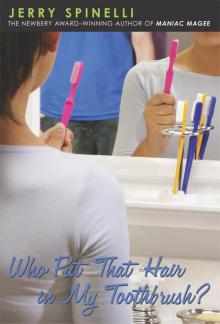 Who Put That Hair in My Toothbrush?
Who Put That Hair in My Toothbrush?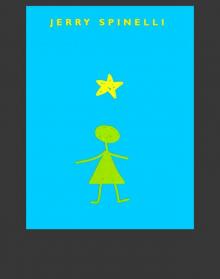 Stargirl
Stargirl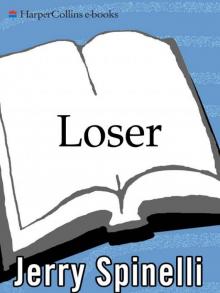 Loser
Loser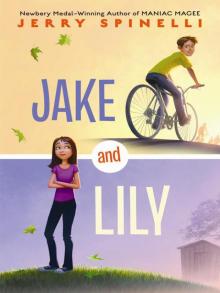 Jake and Lily
Jake and Lily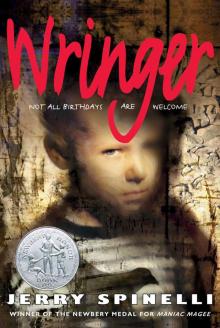 Wringer
Wringer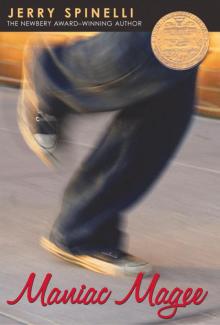 Maniac Magee
Maniac Magee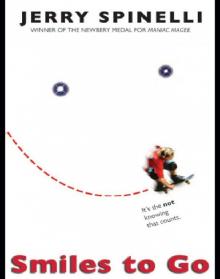 Smiles to Go
Smiles to Go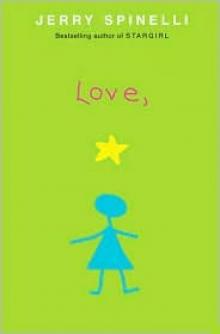 Love, Stargirl
Love, Stargirl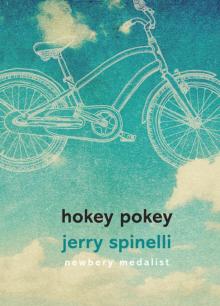 Hokey Pokey
Hokey Pokey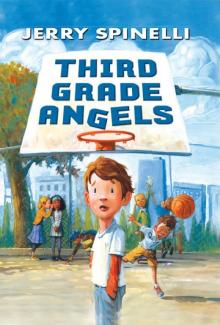 Third Grade Angels
Third Grade Angels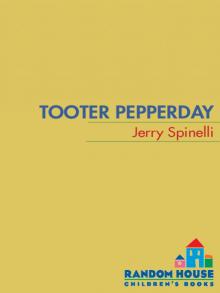 Tooter Pepperday: A Tooter Tale
Tooter Pepperday: A Tooter Tale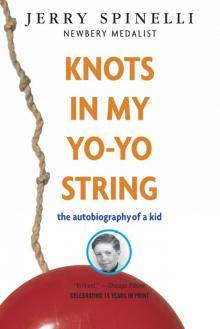 Knots in My Yo-Yo String Knots in My Yo-Yo String
Knots in My Yo-Yo String Knots in My Yo-Yo String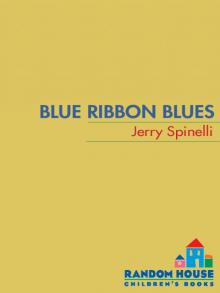 Blue Ribbon Blues: A Tooter Tale
Blue Ribbon Blues: A Tooter Tale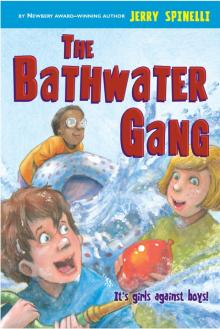 The Bathwater Gang
The Bathwater Gang Crash
Crash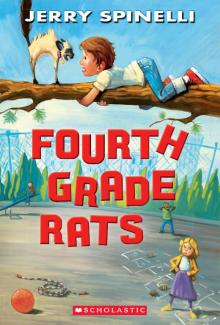 Fourth Grade Rats
Fourth Grade Rats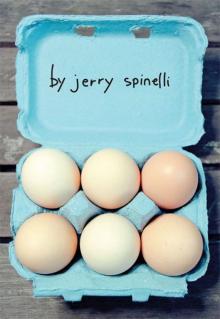 Eggs
Eggs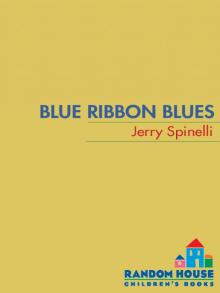 Blue Ribbon Blues
Blue Ribbon Blues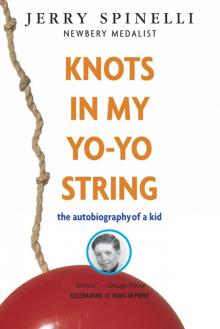 Knots in My Yo-Yo String
Knots in My Yo-Yo String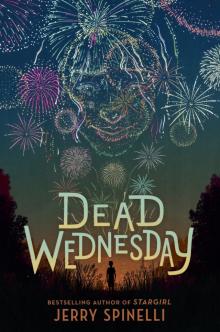 Dead Wednesday
Dead Wednesday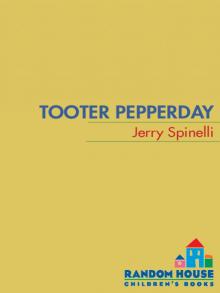 Tooter Pepperday
Tooter Pepperday